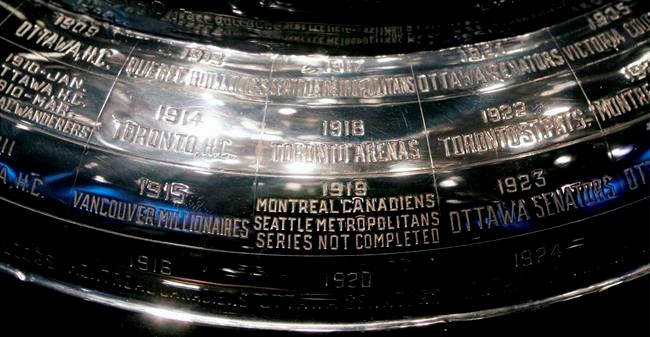Anyone who scoffs at all these drastic measures to deal with the coronavirus outbreak, who wonders if it's really necessary to shut down sports around the world, needs a primer on the 1919 Stanley Cup Finals.
The tragic turns of events is right there on the silver chalice, engraved alongside all the championship teams.
"Series Not Completed."
Yep, there was once a Stanley Cup that had to be called off before the decisive game when Spanish flu swept through the teams.
A star player even lost his life.
As every sport grapples with this unprecedented shutdown and ponders the proper timeline to safely get its athletes back on the fields and into the arenas, a championship hockey series from just over a century ago should at least be lurking in the back of everyone's mind.
“Ï think it underscores that athletes are a lot more intimately connected than they might seem," said Steve Chapelle, who has written a book on the series, “No Decision: The 1919 Stanley Cup Final.”
“You can take the fans out of the arenas to protect the players," he added Friday in a telephone interview. “But everybody on the court or on the field or on the ice still gets so close to each other."
The Spanish flu, which may have actually started in Kansas and claimed tens of millions of lives during its three-year carnage, had been raging since at least early 1918 when the Montreal Canadiens boarded a train for a gruelling cross-country journey to face the Seattle Metropolitans in a best-of-five series for the Stanley Cup.
After a week of travel, which included a couple of exhibition games along the way and was capped by a ferry ride from Vancouver to Seattle, the Canadiens finally arrived in the United States to play for the title.
Chapelle's research found no mention of the flu outbreak in newspaper articles previewing the series. But it didn't take long for the pandemic to overshadow what was happening on the ice.
With the series tied at two games apiece (another contest ended in a tie), both teams were wracked by illness, sending several players to the hospital with temperatures up to 105 degrees. The Canadiens were especially hard hit, winding up with only three healthy players.
Montreal coach George Kennedy, who also fell ill, reportedly offered to forfeit the series to the Metropolitans, but their coach, Pete Muldoon, rejected the offer in a remarkable act of sportsmanship.
In the end, it didn't really matter. Health officials shut down the Seattle Ice Arena to prevent the illness from spreading even more — not long before the final game was scheduled to be played.
Just four days later, Canadiens
“His family was summoned from Brandon," Chapelle said, referring to the Manitoba city that Hall called home. “His wife and a couple of kids, and I believe his brother, were on their way. But he died before they could get there. Frank Patrick (president of the Pacific Coast Hockey Association) had to go to the train station to give them the bad news."
Hall was inducted into the Hockey Hall of Fame in 1961. His biography on the hall's
Two years after the ill-fated series, the pandemic claimed another victim. Kennedy never fully recovered and died from lingering complications two months shy of his 40th birthday.
Chapelle originally wrote his book on the 1919 series a quarter-century ago, but a publishing deal fell through and he filed his manuscript away, figuring it would never see the light of day.
Then, after Seattle was granted an NHL expansion franchise that is set to begin play in 2021, he wondered if there might be some renewed interest in his project. He decided to self-publish and offer it up on Amazon.
As the coronavirus swept the globe, he realized the story was pertinent on a whole different level.
”No matter how big and strong and well-conditioned you might be, you're still vulnerable," Chapelle said. “When something like this gets inside of you, you've got trouble."
Seattle was a member of the upstart PCHA, which was launched in 1911 to challenge the East Coast dominance of what was then known as the National Hockey Association, the precursor to the NHL.
The PCHA was eventually recognized as an equal circuit, leading to an agreement that each league's champion would face off for the Stanley Cup beginning in 1915. Two years later, the Metropolitans became the first U.S.-based team to claim the prize, beating the Canadiens three games to one.
In the era before air travel, it was necessary to play the entire series in one location, switching back and forth in the each game between the leagues' strikingly different rules.
That's what brought the final back to Seattle in 1919 for what was supposed to be a celebration — the first Cup showdown since the end of World War I, with the Canadiens now a member of a league that had morphed from NHA to NHL.
In the end, the final produced nothing but heartbreak.
Strapped for cash, the PCHA eventually merged with another western Canadian league. The combined circuit didn't last, going out of business in 1926.
Ever since then, the Stanley Cup final has been the exclusive domain of the NHL.
Yet that tragic reminder remains on its most cherished award.
“1919. Montreal Canadiens. Seattle Metropolitans. Series Not Completed."
Not completed, perhaps, but certainly worth remembering.
___
Paul Newberry is a sports columnist for The Associated Press. Write to him at pnewberry(at)ap.org, follow him on Twitter at https://twitter.com/pnewberry1963 and find his work at https://apnews.com



